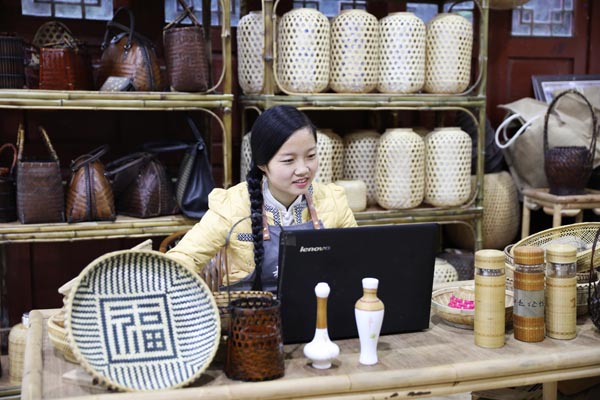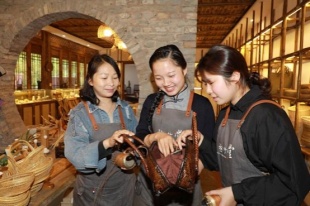Inheritor weaves her way into a better life


In 2012, Yang started a business to sell bamboo-woven products, like jewelry, tea sets and bags after seeing a business opportunity through the craft. "If you sell a bamboo, you can get 6 yuan (84 US cents) at most, but if you sell a bamboo-woven product, which is meticulously crafted, you can get several hundred yuan or even a thousand," says Yang.
Her company has gradually developed from a four-person operation when it was established into a company with 106-strong work force and 12 patents. In 2019, the company's sales volume reached 6 million yuan as its products were sold all over China, and even abroad.
Yang also established an intangible cultural heritage base in Chishui, which combines production, processing, display, research and training of the craft. Since Minzu county, where the base is located, is an attractive place with a number of tourist attractions, Yang hopes the base will become a part of the local tourism circuit in the future.
Growing up in a single-parent family, Yang understands the plight of "left-behind children" and the elderly. As a result, she has taught many local women to weave bamboo. They now produce bamboo products for Yang from home, where they are able to take care of the family instead of migrating to faraway areas to find work. So far, she has helped more than 100 local women in this way.
According to Huang Yongqiong, a woman who works with Yang, "I used to do farm work at home but could only earn just enough money to eat. Now, by learning the craft from Yang and making bamboo products, I can earn about 4,000 yuan a month."
"My company is named Qianshou, which means 'joining hands' in Chinese. I want to take more people's hands and guide them to engage in the bamboo-weaving industry."
Many people admire Yang's record of starting a business at 22, becoming a provincial-level inheritor of an intangible cultural heritage at 24, and being elected as a deputy to the 13th NPC at 28, but behind the success are unknown hardships.
She faced many difficulties in starting her business, especially in collecting funds, organizing groups and establishing sales channels. During the worst of it, she was in debt to the tune of nearly 1 million yuan, which impacted her health.
"From the early stages of my life to when I started the business, I met various difficulties. However, I believe there is always a way of scaling every obstacle that appears in my life," says Yang.
During this year's two sessions, the annual gathering of the National People's Congress and the Chinese People's Political Consultative Conference, held in Beijing, she is focusing on the integration and development of traditional crafts and rural revitalization.
"By inheriting and developing intangible cultural heritage, we can develop special industries which can supplement existing revenue streams in rural areas and help people achieve a better life. I hope the government will offer more help so that traditional crafts can play a bigger role in rural revitalization, poverty alleviation and rural development."





































